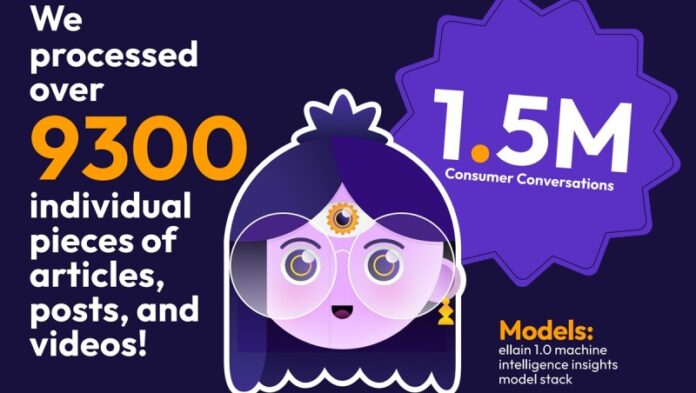Creativ Company is emerging today as a new kind of market intelligence company. It uses AI to do do sentiment analysis on 1.5 million conversations about the top game publishers and their titles.
This means that it uses AI to figure out what gamers think of 17 of the top game publishers — with the insights produced by machine learning. Creativ’s AI was able to analyze over 1.5 million online conversations across Reddit, YouTube, Discord and news articles over six months. It took about 10 days to do. The company went through about 9,300 sources of news and sentiment about the publishers of games. Then it did its analysis for the study, which covered the period from November 1, 2024, through the end of April, 2025.
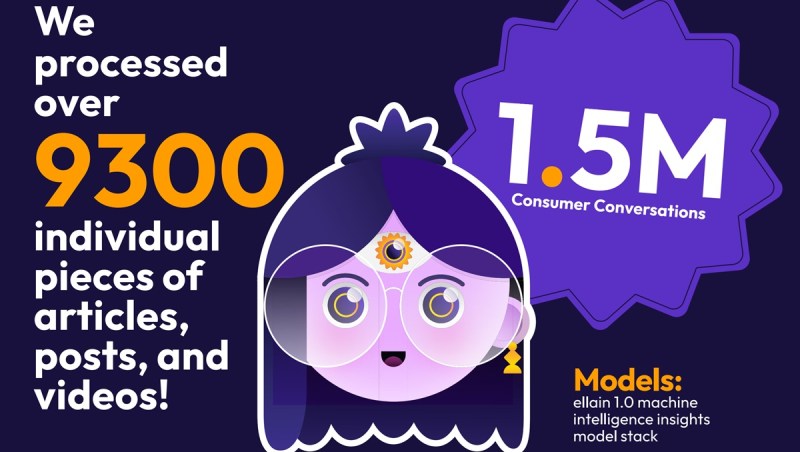
I spoke with Creativ CEO Wes Morton, CTO Joe Lai and COIO (chief operating and information officer) Vibhu Bhan about the results. Here’s some of the info from the exclusive analysis.
“We call ourselves a machine-intelligent marketing firm. And basically the reason we’re doing the study is we’re reinventing how to do consumer insights using LLMs,” Morton said. “The study is literally an ingestion of a million and a half consumer conversations about these different publishers.”
In extracting “sentiment analysis,” the goal is to find out what gamers think about game companies based on what those gamers say on social media. The AI large-language model (LLM) is trained to detect sarcasm, game-specific slang, and more nuances, Bhan said.
“The real innovation here is a better understanding of the context and slang so the sentiment analysis is a lot more contextual and not just a score,” Bhan said. “If you look at traditional sentiment analysis, it looks at the existence of certain words. But language is complex.”
Sentiment analysis has emerged in recent years as a way to understand the zeitgeist around a game or company. But often the analysis suffered because the analysis being used didn’t really understand gamers or their comments about topics. Now, with LLMs, Morton said the machine learning understands the complex nuances and does a better job across more data that it can ingest.
In one example, Creativ found that fans were not happy when actor Henry Cavill was fired from the lead role of Geralt in The Witcher television show on Netflix. Basically, Netflix shouldn’t have fired Cavill, because it led to an overall negative impact on the Witcher franchise. It turns out the show influenced the overall sentiment, rather than the video game series.
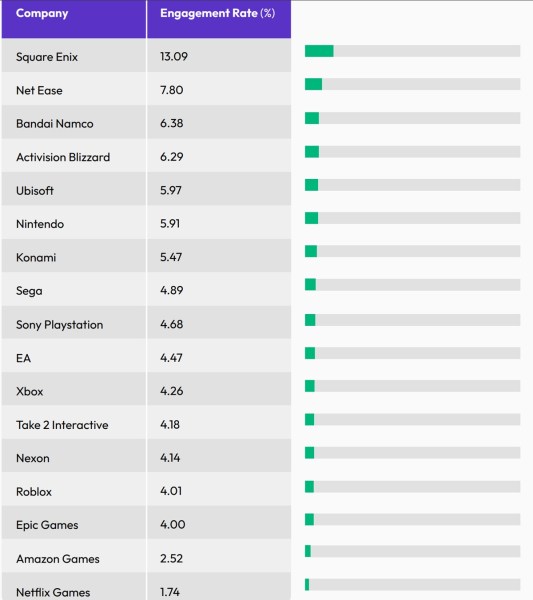
The company ingests the data and then comes up with sentiment scores about the game publishers to see what they’ve done to help or hurt their brand lately in conversation with gamers. Older reports could figure out how often a set of words (like a name of a game or company) was used. But it often didn’t have the ability to understand the full context around a discussion about the games and then properly sum it up. But the LLMs are better at understanding the context around a large amount of data.
“Context becomes a lot more important because that allows you to understand the direction of the sentiment because there could be couple of subjects in the sentence. And the second thing is this switch that we do because of sarcasm, which is being perceived as a fake positive when it is intended as a negative reaction,” Lai said.
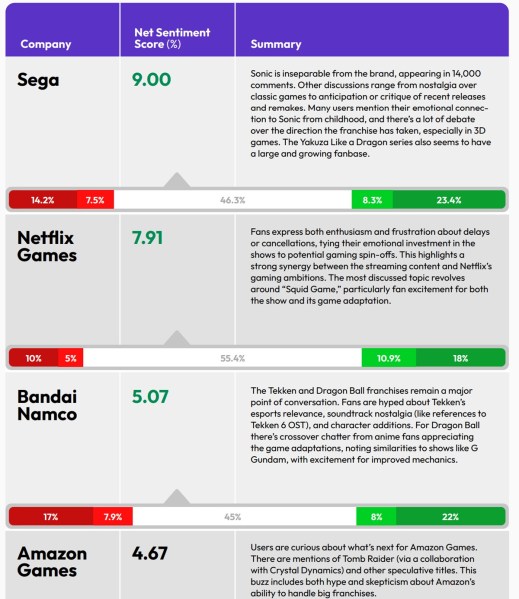
The LLMs have a better ability to understand the context for language, Lai said.
“And the beauty of LLMs is that we’re able to collect and train our models on this gaming data,” Lai said. “We’re able to train the models to be able to detect the news line that comes up for each of these games, as well as if they’re being used in a positive or negative way.”
The biggest topics of conversation
One thing the LLMs picked up on was that gamers had strong opinions on exclusives, and whether a platform owner should keep its best game exclusive or take that game to other platforms in order to generate more sales. Fans who invested their money in a particular console didn’t like that.
The biggest topics for conversation included game monetization, franchises, gaming platforms, exclusives and industry consolidation and corporatization. On monetization, gamers rewarded open communications on rules and studios that avoid monetization models that affect gameplay and mechanics. This was the widest trend in the dataset, with consumers perceiving Activision Blizzard, Ubisoft, EA, Amazon, NetEase, Evolution Gaming and Roblox as particularly bad offenders of poor monetization practices.
In addition, LLMs capture the conversations that naturally happen. By contrast, a study puts the gamer on alert that they’re being polled for their opinions. That gamer might think about whether to answer truthfully or not, based on what they think the study researcher wants to hear.
How the companies fared
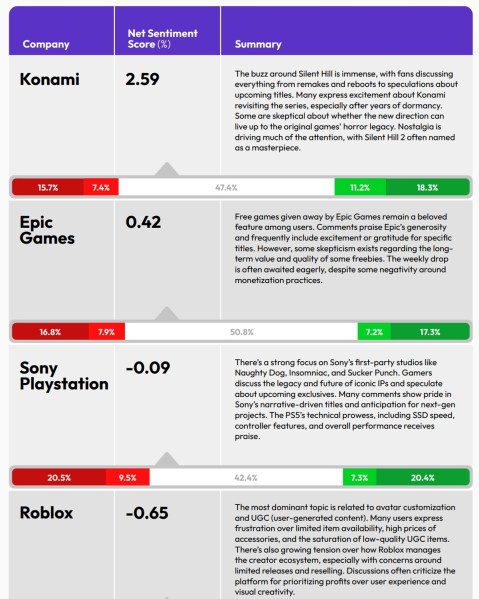
Netflix hasn’t had much history as a game publisher, and its mobile games haven’t been huge hits yet. That helps explain why it got a negative score from gamers. Some of the sentiment happens around a game, just like an NBA game, but a lot of it happens outside the game on social media.
Morton said that games are getting a big awareness lift from Hollywood, as movies based on games like A Minecraft Movie and the TV show The Last of Us are getting high ratings and reaching more people who don’t know about the games.
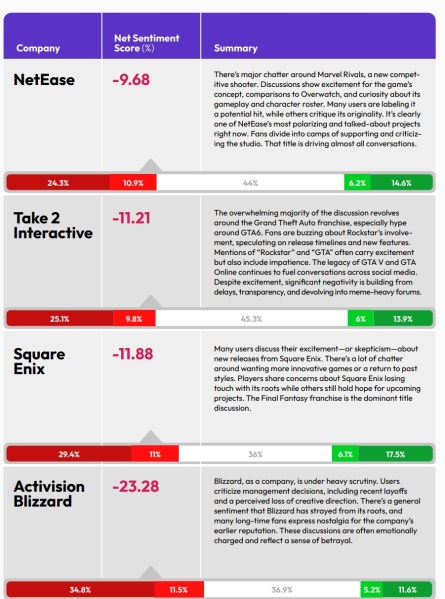
“The cool part about this tech is you can specifically drill down into what is making people happy, sad,” said Morton.
Activision Blizzard had a lot of chatter over World of Warcraft. But many gamers were also not fans of how the company handled the transition from Overwatch to Overwatch 2. Ubisoft also came out with the worst score of all of the game publishers, but it wasn’t clear why. It had a lot of discussion around the characters of Assassin’s Creed: Shadows. But that game received positive reviews in contrast to earlier games like Star Wars: Outlaws and Skull & Bones.
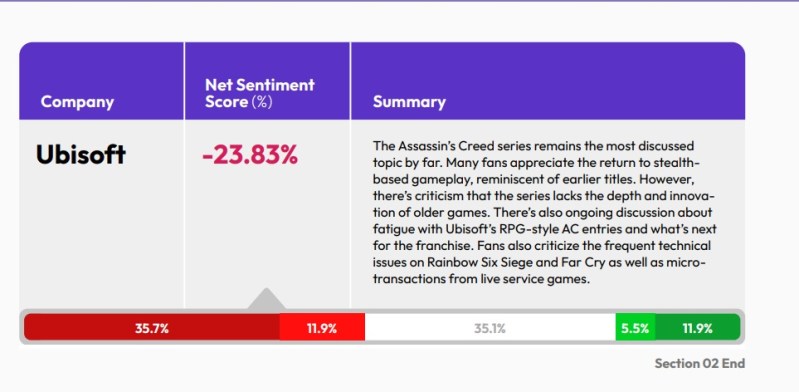
For this study, the company didn’t focus on any particular game. But it could do so in the future.
With LLMs, the study can be done in 10 days, compared to weeks for other methods. Morton said LLMs can only can it absorb and ingest and process data faster, but can analyze a lot more data and a lot faster. Over time, the analysis can get a lot more granular, with a focus on any given game’s characters or other details. Such analysis could give a team a chance to pivot to some other character if it has a negative score.

